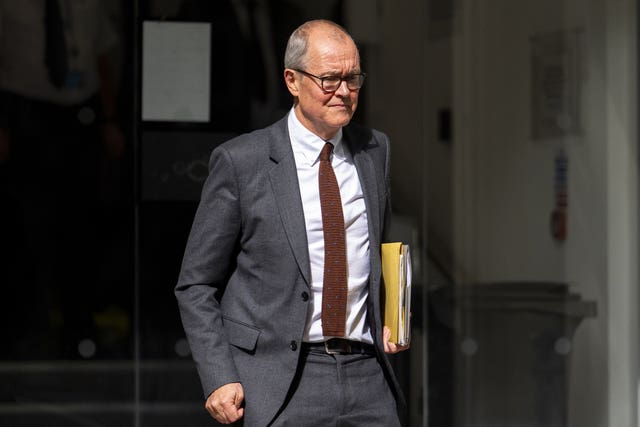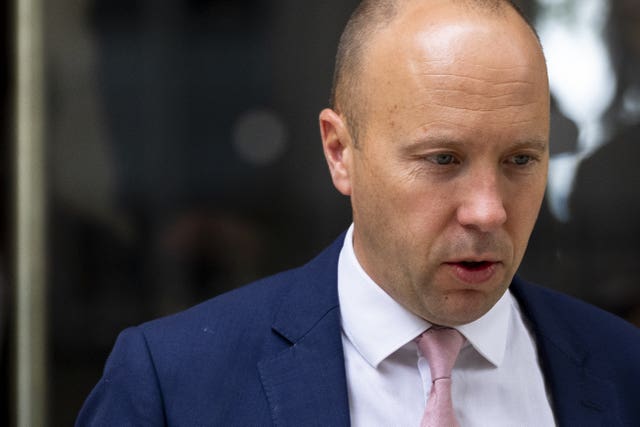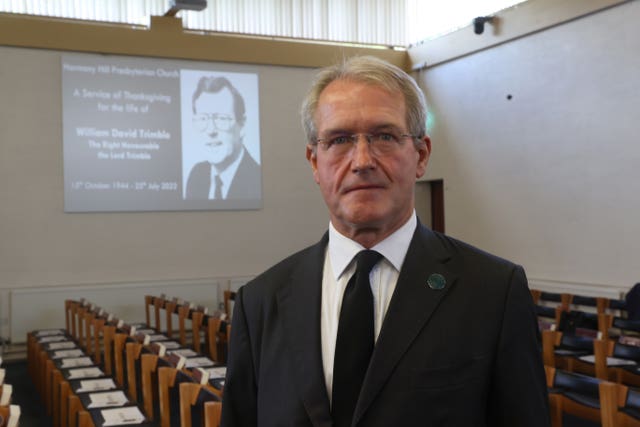Johnson favoured ‘authoritarian approach’ to pandemic punishments, inquiry told
Lord Patrick Vallance was speaking to the seventh module of the Covid-19 Inquiry.

Former prime minister Boris Johnson favoured an “authoritarian approach” to punishing people who failed to isolate during the pandemic, the Covid-19 Inquiry has heard.
Policymakers also preferred punishment over incentive, despite scientists arguing that “support and engagement” were “very important to get adherence up”.
Diary entries written by the then chief scientific adviser Lord Patrick Vallance revealed that those making decisions “always want to go for stick, not carrot”.
On Thursday, Lord Vallance, now science minister, gave evidence to the seventh module of the inquiry which is examining the approach to testing, tracing and isolating.
A series of extracts were shown from his so-called evening notes, which Lord Vallance described as “spontaneous ways to sort of decompress at the end of the day”.
The inquiry heard that members of the Scientific Advisory Group for Emergencies (Sage) “suggested more carrot and incentives required to make people take a test, self-isolate, etc, but they always want to go for stick, not carrot”.
Asked by inquiry counsel Sophie Cartwright who “they” referred to, Lord Vallance replied: “I think in this case, it would have been the decision makers for policy.”
One entry from September 25 2020 shows Mr Johnson suggesting “more punishment” for those not following rules.
It said: “PM: punish people who won’t self-isolate. Punish people who aren’t doing the right thing.
“Close some pubs and bars. We need a lot more punishment and a lot more closing down.”

Lord Vallance wrote: “I put a message in chat that support and engagement very important to get adherence up. PM ends with: ‘massive fines, massive fines’.”
An entry from January 7 2021 gave details of a meeting on testing which included Mr Johnson.
It said: “Testing performance looks much better. Now the challenge is self isolation.”
It added that Dido Harding, who ran the test and trace programme in England at the time, called for better schemes to help people isolate.
Lord Vallance wrote: “PM says: ‘We haven’t been ruthless enough. We need to force more isolation. I favour a more authoritarian approach’.
“Rather late in the day, the PM is understanding that incentives (or removal of disincentives) need to be in place to help people.
“Those instincts are punishment, not help. Sounds like a good testing system is gradually coming together and will be ready when lockdown released.”
Former health secretary Matt Hancock raised concerns that the country’s ability to scale up testing and tracing has been “dismantled” and will be hard to achieve again in a future pandemic.
He wrote in his witness statement that “the key lesson for the future is that a rapidly scalable testing and tracing infrastructure should be maintained ready for urgent expansion”.
Reading the statement aloud, Ms Cartwright said: “You say this: ‘I’m concerned at present, our current capacity has been dismantled, and we’ll find it much harder to scale again in the future as a result’.”
Mr Hancock said it would be “hard to make the case” for large and permanent factory-scale testing in preparation for the next pandemic.
“That would be, in a perfect world, what you’d have, in the same way that you have a standing army,” he added.
“There is a case for it, but there’s also a case against because it’s expensive.

“What, in my view, there is absolutely no case against is having a plan and a system ready to go to build those factories; to take the units, to bring in the PCR testing machines, or whatever the latest technology is, and to be ready to go.”
Mr Hancock was asked about ex-MP Owen Paterson’s involvement with a company awarded a contract to supply millions of Covid tests.
Mr Paterson quit as an MP in 2021 after he was found to have breached rules on paid advocacy when he lobbied ministers on behalf of Randox.
Ms Cartwright asked: “Do you accept, Mr Hancock, that, at the very least, to maintain public confidence, a contract of that scale should have been handled with maximum transparency as part of the creation of the test, trace, isolate system?”
He replied: “In a utopia? Yes, but we weren’t living in a utopia. People were dying every day, and Randox had the capacity to radically increase the number of tests available, along with the other testing companies.”
Mr Hancock praised the company which “did an amazing job during this period”.

Mentioning Mr Paterson, Ms Cartwright went on: “There were plainly ministerial meetings that were not recorded, that have also been commented about. Were you at the time aware that those meetings had not been properly recorded?”
“No, not that I can recall,” he replied.
Former health minister Lord James Bethell was asked if there was “sufficient consideration given to working with universities as laboratories”.
He said “a huge amount of effort went into not just universities, but hospital pathology labs, animal pathology labs, all manner of private, public and university testing laboratories”, and that he was “lobbied on an hourly basis by just about everyone who had a PCR machine”.
He told the inquiry he “spent a huge amount of effort to try to figure out a way of creating an Uber for diagnostics” but “it was a total disaster”.
“It just didn’t work. They were regularly late. They regularly lost tests. The turnaround times weren’t quick enough. The data got in a mess. It was very, very expensive.
“And I would have loved for that effort to have worked.”





